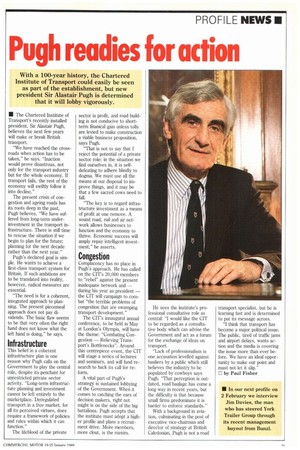Pugh readies for action
Page 23

If you've noticed an error in this article please click here to report it so we can fix it.
With a 100-year history, the Chartered Institute of Transport could easily be seen as part of the establishment, but new president Sir Alastair Pugh is determined that it will lobby vigorously.
• The Chartered Institute of Transport's recently installed president, Sir Alastair Pugh, believes the next few years will make or break British transport.
"We have reached the crossroads when action has to be taken," he says. "Inaction would prove disastrous, not only for the transport industry but for the whole economy. If transport fails, the rest of the economy will swiftly follow it into decline."
The present crisis of congestion and ageing roads has its roots deep in the past, NO believes. "We have suffered from long-term underinvestment in the transport infrastructure. There is still time to rescue the situation if we begin to plan for the future; planning for the next decade rather than the next year."
Pugh's declared goal is simple. He wants to achieve a first-class transport system for Britain. If such ambitions are to be translated into reality, however, radical measures are essential.
"The need is for a coherent, integrated approach to planning. The present piecemeal approach does not pay dividends. The basic flaw seems to be that very often the right hand does not know what the left hand is doing," he says.
Infrastructure
This belief in a coherent infrastructure plan is one reason why Pugh calls on the Government to play the central role, despite its penchant for unrestricted private sector activity. "Long-term infrastructure planning and investment cannot be left entirely to the marketplace. Deregulated transport in a free market, for all its perceived virtues, does require a framework of policies and rules within which it can function."
The lifeblood of the private sector is profit, and road building is not conducive to shortterm fmanical gain unless tolls are levied to make construction a viable business proposition, says Pugh.
"That is not to say that I reject the potential of a private sector role: in the situation we find ourselves in, it is selfdefeating to adhere blindly to dogma. We must use all the means at our disposal to improve things, and it may be that a few sacred cows need to fall.
"The key is to regard infrastructure investment as a means of profit at one remove. A sound road, rail and air network allows businesses to function and the economy to thrive. Economic success will amply repay intelligent investment," he asserts.
Congestion
Complacency has no place in Pugh's approach. He has called on the CIT's 20,000 members to "rebel" against the present inadequate network and — during his year as president — the crr will campaign to combat "the terrible problems of congestion that are swamping transport development."
The CIT's innaugural annual conference, to be held in May at London's Olympia, will have the theme: "Combating Congestion — Relieving Transport's Bottlenecks". Around this centrepiece event, the CIT will stage a series of lectures and seminars, and will fund research to back its call for reform.
A vital part of Pugh's strategy is sustained lobbying of the Government. When it comes to catching the ears of decision makers, right not might is on the side of the big battalions. Pugh accepts that the institute must adopt a higher profile and plans a recruitment drive. More members, more clout, is the maxim. He sees the institute's professional consultative role as central: "I would like the CIT to be regarded as a consultative body which can advise the Government and act as a forum for the exchange of ideas on transport.
"Lack of professionalism is one accusation levelled against hauliers by a public which still believes the industry to be populated by cowboys says Pugh. "That perception is outdated, road haulage has come a long way in recent years, but the difficulty is that because small firms predominate it is harder to enforce standards."
With a background in aviation, culminating in the post of executive vice-chairman and director of strategy at British Caledonian, Pugh is not a road transport specialist, but he is learning fast and is determined to put its message across.
"I think that transport has become a major political issue. The public, tired of traffic jams and airport delays, wants action and the media is covering the issue more than ever before. We have an ideal opportunity to make our point and must not let it slip."
O by Paul Fisher
































































































